Critical Evaluation of Sustainable Hospitality and Management
VerifiedAdded on 2023/01/04
|9
|2986
|43
Report
AI Summary
This report critically examines sustainability within the hospitality and tourism sectors. It explores the environmental impact of the industry, including waste generation, energy and water consumption, and carbon emissions. The report analyzes sustainable good practices in various contexts, such as rural, coastal, and urban areas, and in the transport sector, highlighting the vulnerabilities and challenges faced by each. It also discusses the changes in society driving the need for sustainable development and evaluates the concept of good practice within the industry. The report references initiatives by companies like Marriott, showcasing strategies for environmental mitigation, sustainable development, and corporate social responsibility. It also delves into the importance of stakeholder involvement, the impact of overtourism, and the need for a balanced approach to sustainability, emphasizing the role of both the industry and visitors in promoting eco-friendly practices. The report concludes by emphasizing the importance of long-term value creation, efficient resource usage, and local community involvement in achieving sustainable outcomes.
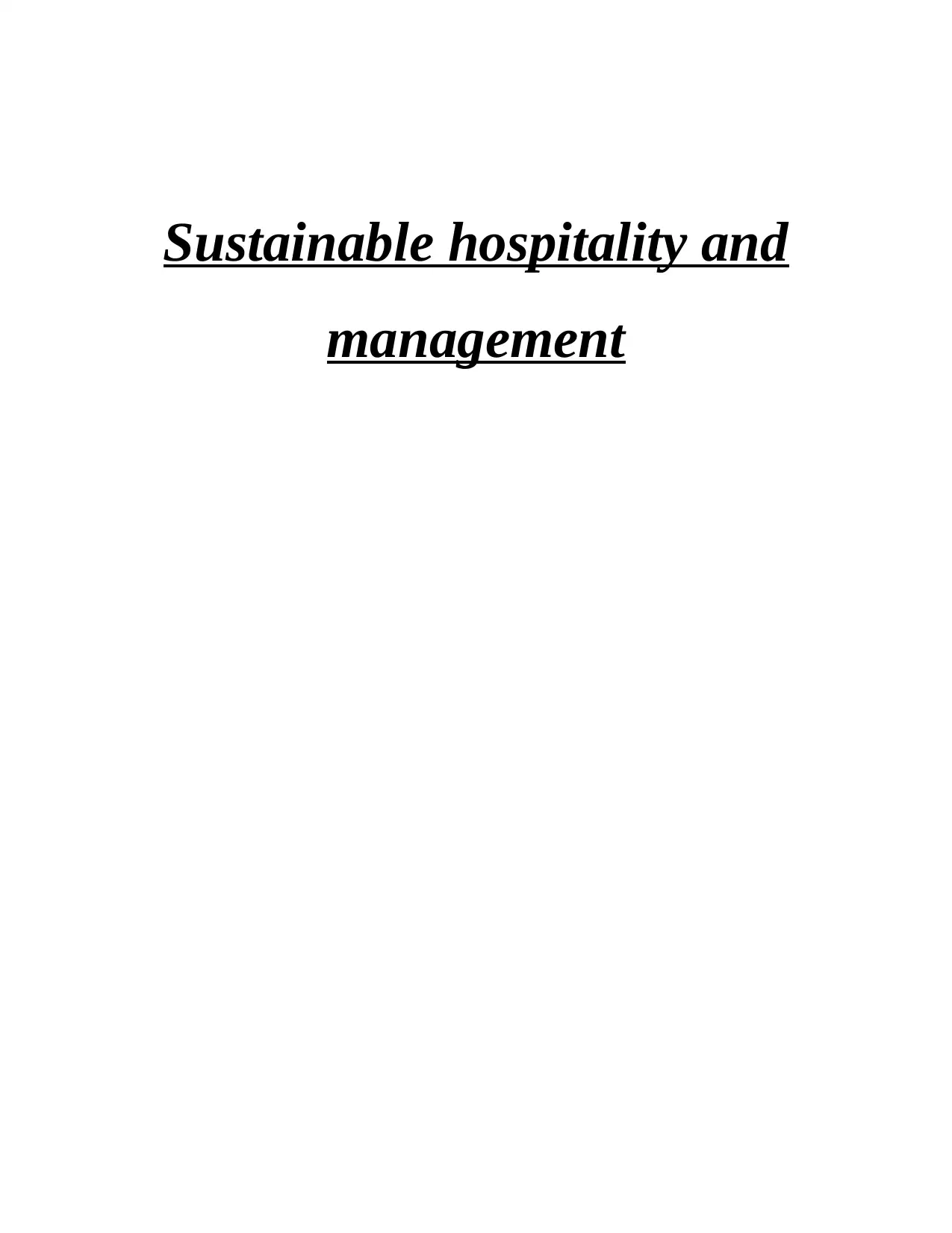
Sustainable hospitality and
management
management
Paraphrase This Document
Need a fresh take? Get an instant paraphrase of this document with our AI Paraphraser
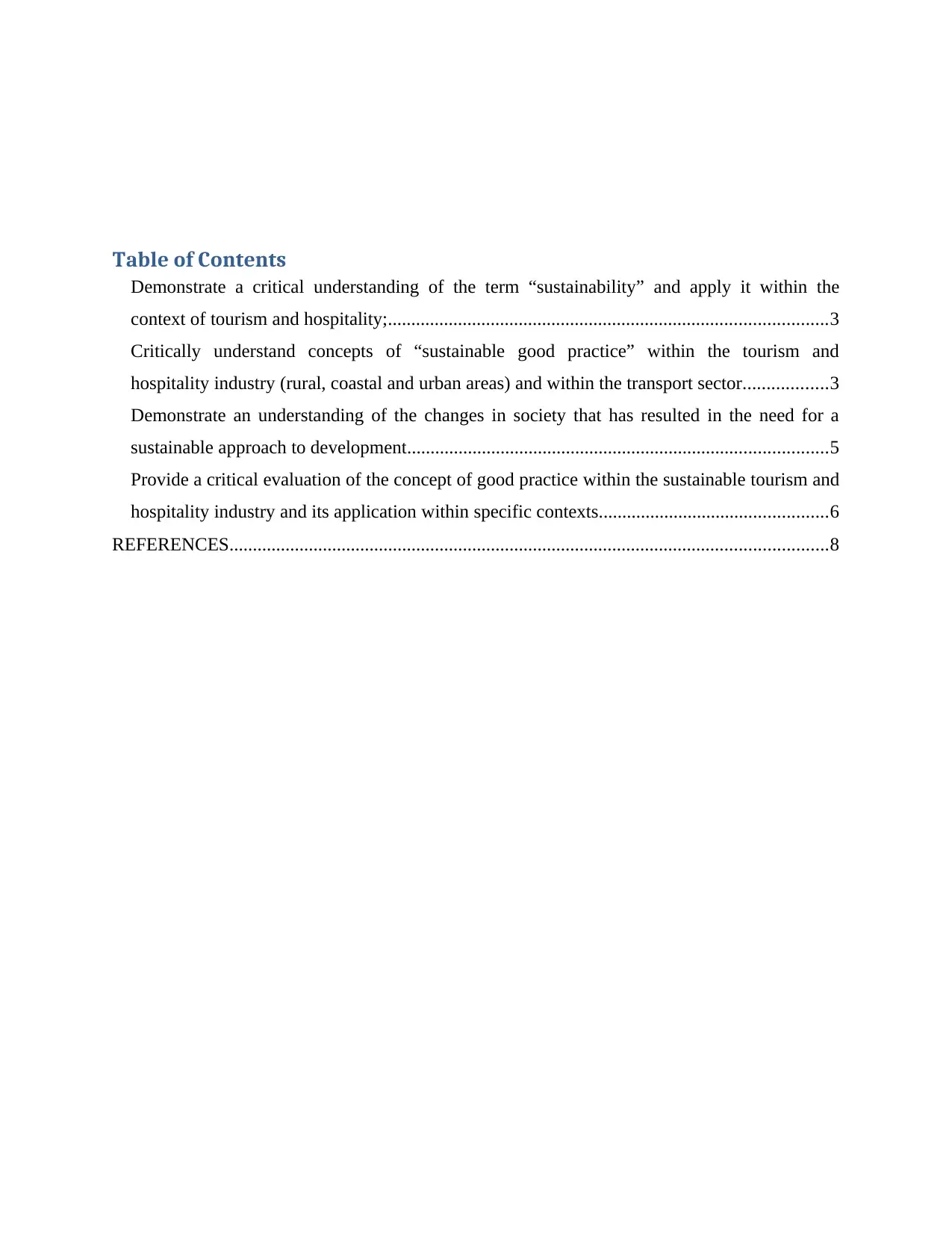
Table of Contents
Demonstrate a critical understanding of the term “sustainability” and apply it within the
context of tourism and hospitality;..............................................................................................3
Critically understand concepts of “sustainable good practice” within the tourism and
hospitality industry (rural, coastal and urban areas) and within the transport sector..................3
Demonstrate an understanding of the changes in society that has resulted in the need for a
sustainable approach to development..........................................................................................5
Provide a critical evaluation of the concept of good practice within the sustainable tourism and
hospitality industry and its application within specific contexts.................................................6
REFERENCES................................................................................................................................8
Demonstrate a critical understanding of the term “sustainability” and apply it within the
context of tourism and hospitality;..............................................................................................3
Critically understand concepts of “sustainable good practice” within the tourism and
hospitality industry (rural, coastal and urban areas) and within the transport sector..................3
Demonstrate an understanding of the changes in society that has resulted in the need for a
sustainable approach to development..........................................................................................5
Provide a critical evaluation of the concept of good practice within the sustainable tourism and
hospitality industry and its application within specific contexts.................................................6
REFERENCES................................................................................................................................8
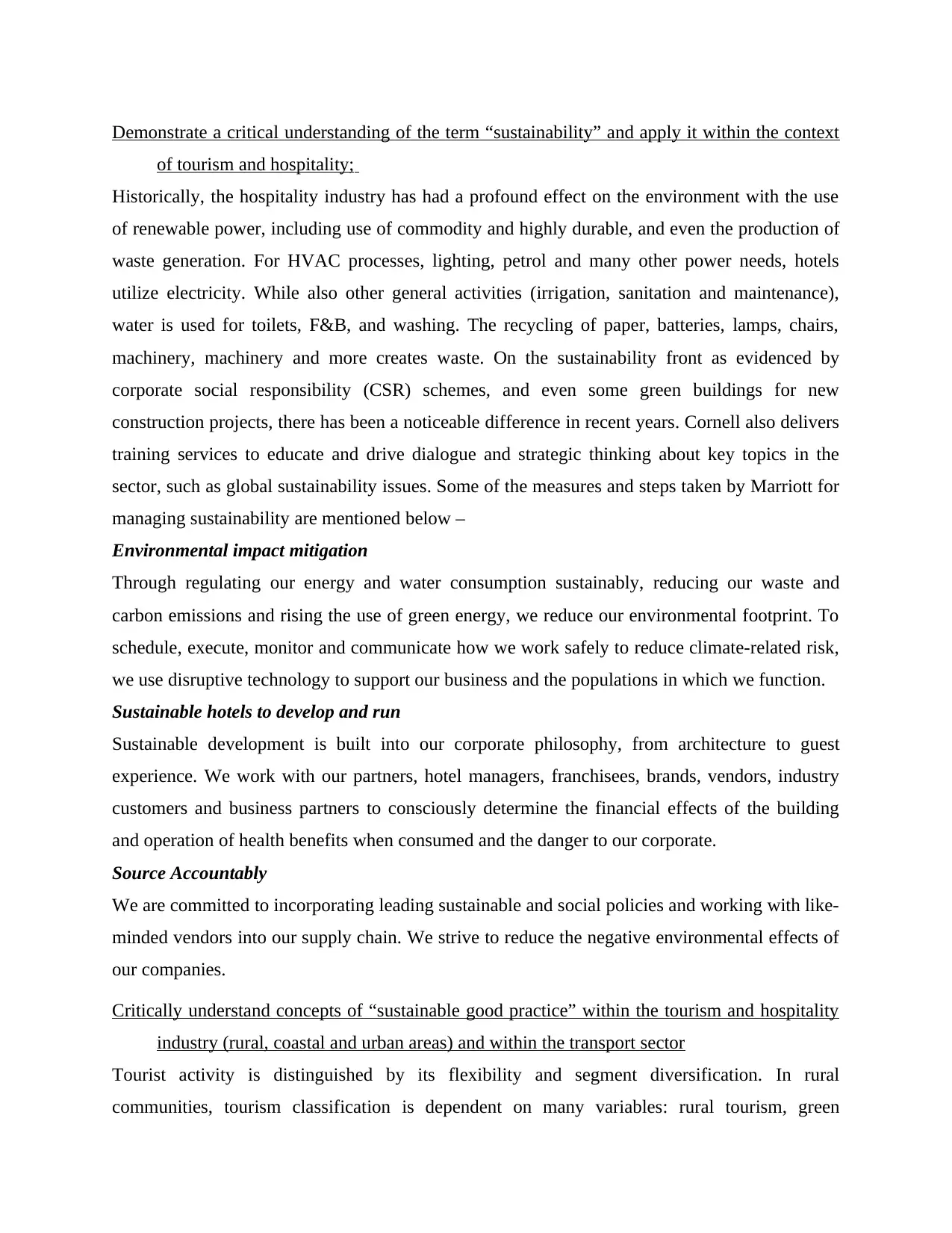
Demonstrate a critical understanding of the term “sustainability” and apply it within the context
of tourism and hospitality;
Historically, the hospitality industry has had a profound effect on the environment with the use
of renewable power, including use of commodity and highly durable, and even the production of
waste generation. For HVAC processes, lighting, petrol and many other power needs, hotels
utilize electricity. While also other general activities (irrigation, sanitation and maintenance),
water is used for toilets, F&B, and washing. The recycling of paper, batteries, lamps, chairs,
machinery, machinery and more creates waste. On the sustainability front as evidenced by
corporate social responsibility (CSR) schemes, and even some green buildings for new
construction projects, there has been a noticeable difference in recent years. Cornell also delivers
training services to educate and drive dialogue and strategic thinking about key topics in the
sector, such as global sustainability issues. Some of the measures and steps taken by Marriott for
managing sustainability are mentioned below –
Environmental impact mitigation
Through regulating our energy and water consumption sustainably, reducing our waste and
carbon emissions and rising the use of green energy, we reduce our environmental footprint. To
schedule, execute, monitor and communicate how we work safely to reduce climate-related risk,
we use disruptive technology to support our business and the populations in which we function.
Sustainable hotels to develop and run
Sustainable development is built into our corporate philosophy, from architecture to guest
experience. We work with our partners, hotel managers, franchisees, brands, vendors, industry
customers and business partners to consciously determine the financial effects of the building
and operation of health benefits when consumed and the danger to our corporate.
Source Accountably
We are committed to incorporating leading sustainable and social policies and working with like-
minded vendors into our supply chain. We strive to reduce the negative environmental effects of
our companies.
Critically understand concepts of “sustainable good practice” within the tourism and hospitality
industry (rural, coastal and urban areas) and within the transport sector
Tourist activity is distinguished by its flexibility and segment diversification. In rural
communities, tourism classification is dependent on many variables: rural tourism, green
of tourism and hospitality;
Historically, the hospitality industry has had a profound effect on the environment with the use
of renewable power, including use of commodity and highly durable, and even the production of
waste generation. For HVAC processes, lighting, petrol and many other power needs, hotels
utilize electricity. While also other general activities (irrigation, sanitation and maintenance),
water is used for toilets, F&B, and washing. The recycling of paper, batteries, lamps, chairs,
machinery, machinery and more creates waste. On the sustainability front as evidenced by
corporate social responsibility (CSR) schemes, and even some green buildings for new
construction projects, there has been a noticeable difference in recent years. Cornell also delivers
training services to educate and drive dialogue and strategic thinking about key topics in the
sector, such as global sustainability issues. Some of the measures and steps taken by Marriott for
managing sustainability are mentioned below –
Environmental impact mitigation
Through regulating our energy and water consumption sustainably, reducing our waste and
carbon emissions and rising the use of green energy, we reduce our environmental footprint. To
schedule, execute, monitor and communicate how we work safely to reduce climate-related risk,
we use disruptive technology to support our business and the populations in which we function.
Sustainable hotels to develop and run
Sustainable development is built into our corporate philosophy, from architecture to guest
experience. We work with our partners, hotel managers, franchisees, brands, vendors, industry
customers and business partners to consciously determine the financial effects of the building
and operation of health benefits when consumed and the danger to our corporate.
Source Accountably
We are committed to incorporating leading sustainable and social policies and working with like-
minded vendors into our supply chain. We strive to reduce the negative environmental effects of
our companies.
Critically understand concepts of “sustainable good practice” within the tourism and hospitality
industry (rural, coastal and urban areas) and within the transport sector
Tourist activity is distinguished by its flexibility and segment diversification. In rural
communities, tourism classification is dependent on many variables: rural tourism, green
⊘ This is a preview!⊘
Do you want full access?
Subscribe today to unlock all pages.

Trusted by 1+ million students worldwide
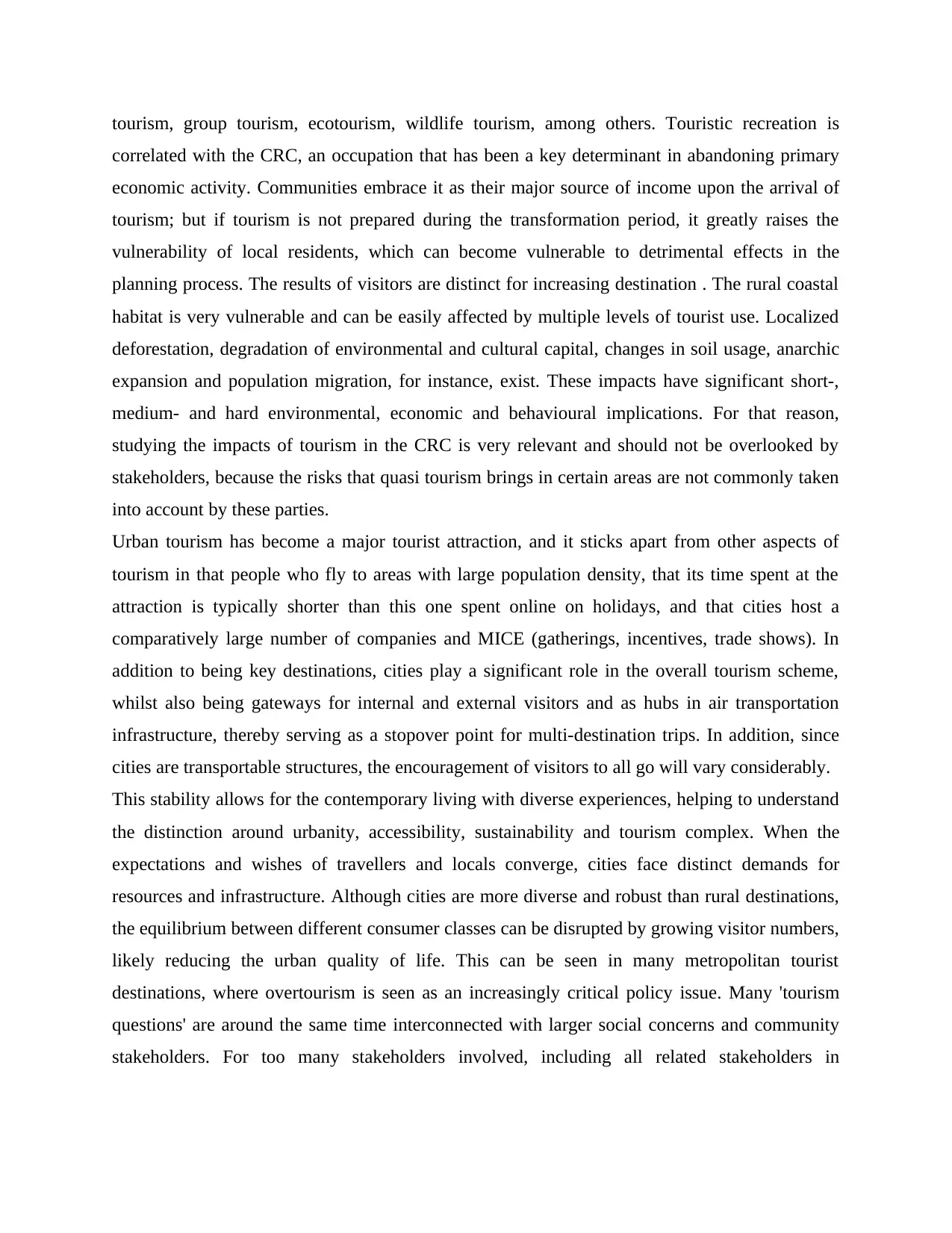
tourism, group tourism, ecotourism, wildlife tourism, among others. Touristic recreation is
correlated with the CRC, an occupation that has been a key determinant in abandoning primary
economic activity. Communities embrace it as their major source of income upon the arrival of
tourism; but if tourism is not prepared during the transformation period, it greatly raises the
vulnerability of local residents, which can become vulnerable to detrimental effects in the
planning process. The results of visitors are distinct for increasing destination . The rural coastal
habitat is very vulnerable and can be easily affected by multiple levels of tourist use. Localized
deforestation, degradation of environmental and cultural capital, changes in soil usage, anarchic
expansion and population migration, for instance, exist. These impacts have significant short-,
medium- and hard environmental, economic and behavioural implications. For that reason,
studying the impacts of tourism in the CRC is very relevant and should not be overlooked by
stakeholders, because the risks that quasi tourism brings in certain areas are not commonly taken
into account by these parties.
Urban tourism has become a major tourist attraction, and it sticks apart from other aspects of
tourism in that people who fly to areas with large population density, that its time spent at the
attraction is typically shorter than this one spent online on holidays, and that cities host a
comparatively large number of companies and MICE (gatherings, incentives, trade shows). In
addition to being key destinations, cities play a significant role in the overall tourism scheme,
whilst also being gateways for internal and external visitors and as hubs in air transportation
infrastructure, thereby serving as a stopover point for multi-destination trips. In addition, since
cities are transportable structures, the encouragement of visitors to all go will vary considerably.
This stability allows for the contemporary living with diverse experiences, helping to understand
the distinction around urbanity, accessibility, sustainability and tourism complex. When the
expectations and wishes of travellers and locals converge, cities face distinct demands for
resources and infrastructure. Although cities are more diverse and robust than rural destinations,
the equilibrium between different consumer classes can be disrupted by growing visitor numbers,
likely reducing the urban quality of life. This can be seen in many metropolitan tourist
destinations, where overtourism is seen as an increasingly critical policy issue. Many 'tourism
questions' are around the same time interconnected with larger social concerns and community
stakeholders. For too many stakeholders involved, including all related stakeholders in
correlated with the CRC, an occupation that has been a key determinant in abandoning primary
economic activity. Communities embrace it as their major source of income upon the arrival of
tourism; but if tourism is not prepared during the transformation period, it greatly raises the
vulnerability of local residents, which can become vulnerable to detrimental effects in the
planning process. The results of visitors are distinct for increasing destination . The rural coastal
habitat is very vulnerable and can be easily affected by multiple levels of tourist use. Localized
deforestation, degradation of environmental and cultural capital, changes in soil usage, anarchic
expansion and population migration, for instance, exist. These impacts have significant short-,
medium- and hard environmental, economic and behavioural implications. For that reason,
studying the impacts of tourism in the CRC is very relevant and should not be overlooked by
stakeholders, because the risks that quasi tourism brings in certain areas are not commonly taken
into account by these parties.
Urban tourism has become a major tourist attraction, and it sticks apart from other aspects of
tourism in that people who fly to areas with large population density, that its time spent at the
attraction is typically shorter than this one spent online on holidays, and that cities host a
comparatively large number of companies and MICE (gatherings, incentives, trade shows). In
addition to being key destinations, cities play a significant role in the overall tourism scheme,
whilst also being gateways for internal and external visitors and as hubs in air transportation
infrastructure, thereby serving as a stopover point for multi-destination trips. In addition, since
cities are transportable structures, the encouragement of visitors to all go will vary considerably.
This stability allows for the contemporary living with diverse experiences, helping to understand
the distinction around urbanity, accessibility, sustainability and tourism complex. When the
expectations and wishes of travellers and locals converge, cities face distinct demands for
resources and infrastructure. Although cities are more diverse and robust than rural destinations,
the equilibrium between different consumer classes can be disrupted by growing visitor numbers,
likely reducing the urban quality of life. This can be seen in many metropolitan tourist
destinations, where overtourism is seen as an increasingly critical policy issue. Many 'tourism
questions' are around the same time interconnected with larger social concerns and community
stakeholders. For too many stakeholders involved, including all related stakeholders in
Paraphrase This Document
Need a fresh take? Get an instant paraphrase of this document with our AI Paraphraser
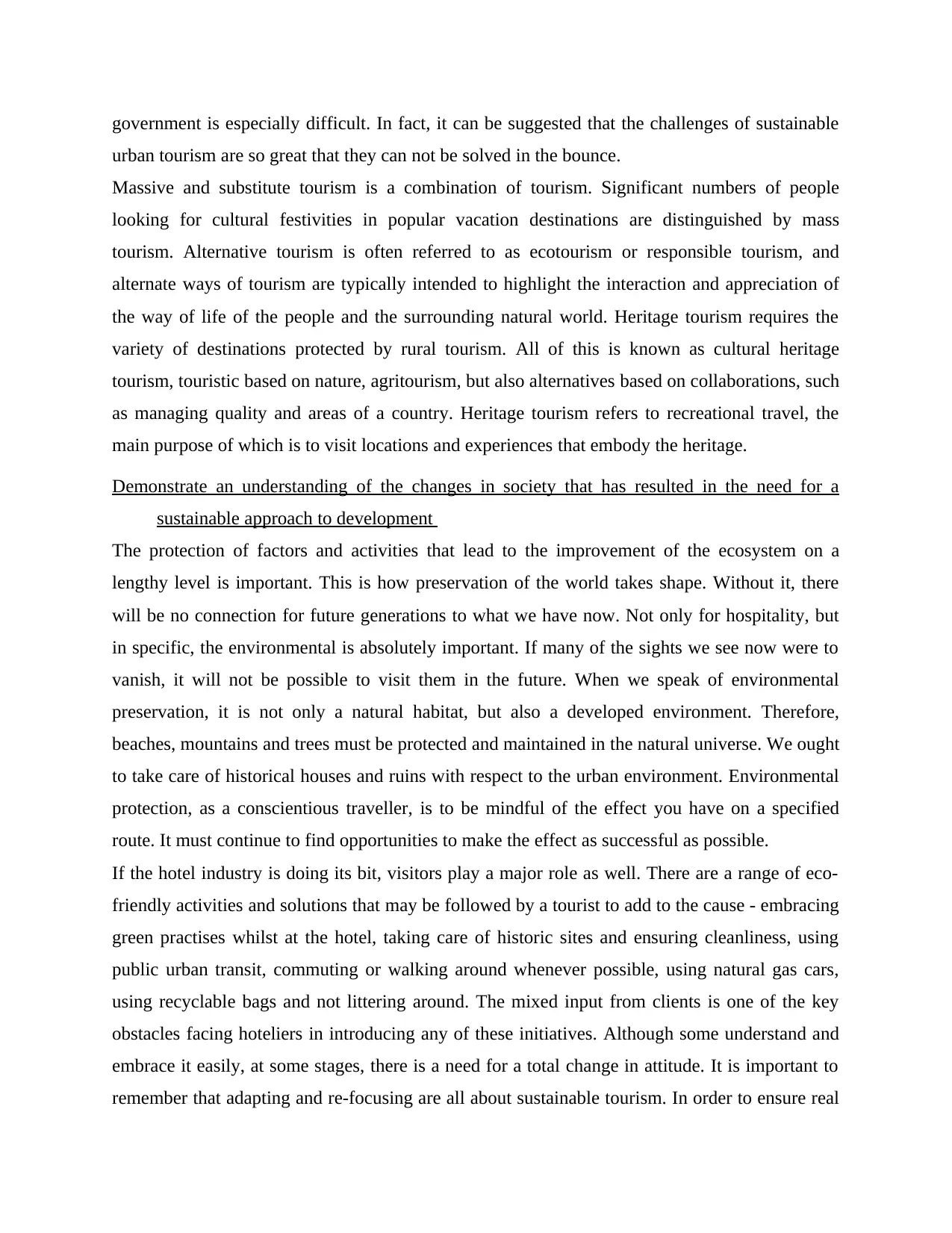
government is especially difficult. In fact, it can be suggested that the challenges of sustainable
urban tourism are so great that they can not be solved in the bounce.
Massive and substitute tourism is a combination of tourism. Significant numbers of people
looking for cultural festivities in popular vacation destinations are distinguished by mass
tourism. Alternative tourism is often referred to as ecotourism or responsible tourism, and
alternate ways of tourism are typically intended to highlight the interaction and appreciation of
the way of life of the people and the surrounding natural world. Heritage tourism requires the
variety of destinations protected by rural tourism. All of this is known as cultural heritage
tourism, touristic based on nature, agritourism, but also alternatives based on collaborations, such
as managing quality and areas of a country. Heritage tourism refers to recreational travel, the
main purpose of which is to visit locations and experiences that embody the heritage.
Demonstrate an understanding of the changes in society that has resulted in the need for a
sustainable approach to development
The protection of factors and activities that lead to the improvement of the ecosystem on a
lengthy level is important. This is how preservation of the world takes shape. Without it, there
will be no connection for future generations to what we have now. Not only for hospitality, but
in specific, the environmental is absolutely important. If many of the sights we see now were to
vanish, it will not be possible to visit them in the future. When we speak of environmental
preservation, it is not only a natural habitat, but also a developed environment. Therefore,
beaches, mountains and trees must be protected and maintained in the natural universe. We ought
to take care of historical houses and ruins with respect to the urban environment. Environmental
protection, as a conscientious traveller, is to be mindful of the effect you have on a specified
route. It must continue to find opportunities to make the effect as successful as possible.
If the hotel industry is doing its bit, visitors play a major role as well. There are a range of eco-
friendly activities and solutions that may be followed by a tourist to add to the cause - embracing
green practises whilst at the hotel, taking care of historic sites and ensuring cleanliness, using
public urban transit, commuting or walking around whenever possible, using natural gas cars,
using recyclable bags and not littering around. The mixed input from clients is one of the key
obstacles facing hoteliers in introducing any of these initiatives. Although some understand and
embrace it easily, at some stages, there is a need for a total change in attitude. It is important to
remember that adapting and re-focusing are all about sustainable tourism. In order to ensure real
urban tourism are so great that they can not be solved in the bounce.
Massive and substitute tourism is a combination of tourism. Significant numbers of people
looking for cultural festivities in popular vacation destinations are distinguished by mass
tourism. Alternative tourism is often referred to as ecotourism or responsible tourism, and
alternate ways of tourism are typically intended to highlight the interaction and appreciation of
the way of life of the people and the surrounding natural world. Heritage tourism requires the
variety of destinations protected by rural tourism. All of this is known as cultural heritage
tourism, touristic based on nature, agritourism, but also alternatives based on collaborations, such
as managing quality and areas of a country. Heritage tourism refers to recreational travel, the
main purpose of which is to visit locations and experiences that embody the heritage.
Demonstrate an understanding of the changes in society that has resulted in the need for a
sustainable approach to development
The protection of factors and activities that lead to the improvement of the ecosystem on a
lengthy level is important. This is how preservation of the world takes shape. Without it, there
will be no connection for future generations to what we have now. Not only for hospitality, but
in specific, the environmental is absolutely important. If many of the sights we see now were to
vanish, it will not be possible to visit them in the future. When we speak of environmental
preservation, it is not only a natural habitat, but also a developed environment. Therefore,
beaches, mountains and trees must be protected and maintained in the natural universe. We ought
to take care of historical houses and ruins with respect to the urban environment. Environmental
protection, as a conscientious traveller, is to be mindful of the effect you have on a specified
route. It must continue to find opportunities to make the effect as successful as possible.
If the hotel industry is doing its bit, visitors play a major role as well. There are a range of eco-
friendly activities and solutions that may be followed by a tourist to add to the cause - embracing
green practises whilst at the hotel, taking care of historic sites and ensuring cleanliness, using
public urban transit, commuting or walking around whenever possible, using natural gas cars,
using recyclable bags and not littering around. The mixed input from clients is one of the key
obstacles facing hoteliers in introducing any of these initiatives. Although some understand and
embrace it easily, at some stages, there is a need for a total change in attitude. It is important to
remember that adapting and re-focusing are all about sustainable tourism. In order to ensure real
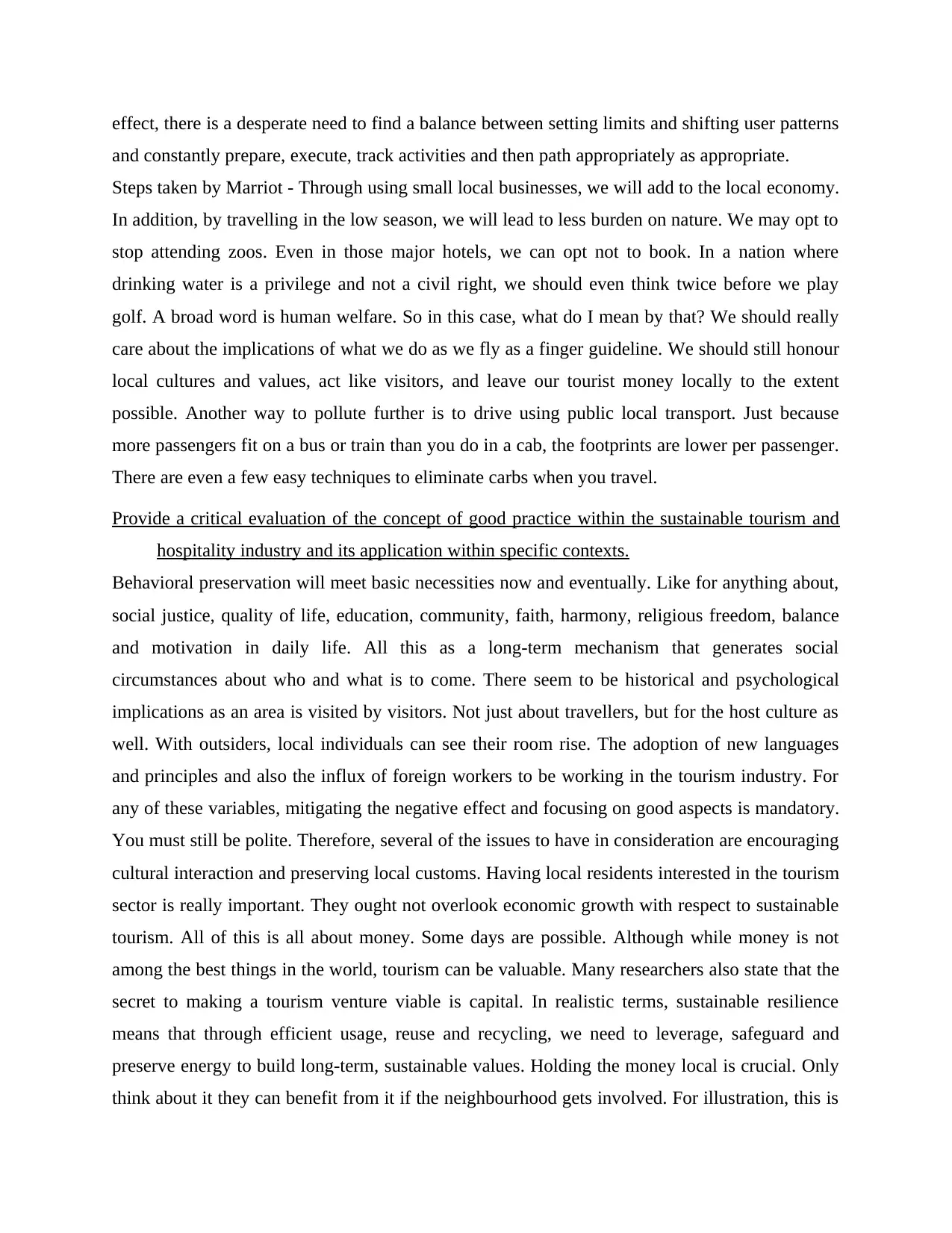
effect, there is a desperate need to find a balance between setting limits and shifting user patterns
and constantly prepare, execute, track activities and then path appropriately as appropriate.
Steps taken by Marriot - Through using small local businesses, we will add to the local economy.
In addition, by travelling in the low season, we will lead to less burden on nature. We may opt to
stop attending zoos. Even in those major hotels, we can opt not to book. In a nation where
drinking water is a privilege and not a civil right, we should even think twice before we play
golf. A broad word is human welfare. So in this case, what do I mean by that? We should really
care about the implications of what we do as we fly as a finger guideline. We should still honour
local cultures and values, act like visitors, and leave our tourist money locally to the extent
possible. Another way to pollute further is to drive using public local transport. Just because
more passengers fit on a bus or train than you do in a cab, the footprints are lower per passenger.
There are even a few easy techniques to eliminate carbs when you travel.
Provide a critical evaluation of the concept of good practice within the sustainable tourism and
hospitality industry and its application within specific contexts.
Behavioral preservation will meet basic necessities now and eventually. Like for anything about,
social justice, quality of life, education, community, faith, harmony, religious freedom, balance
and motivation in daily life. All this as a long-term mechanism that generates social
circumstances about who and what is to come. There seem to be historical and psychological
implications as an area is visited by visitors. Not just about travellers, but for the host culture as
well. With outsiders, local individuals can see their room rise. The adoption of new languages
and principles and also the influx of foreign workers to be working in the tourism industry. For
any of these variables, mitigating the negative effect and focusing on good aspects is mandatory.
You must still be polite. Therefore, several of the issues to have in consideration are encouraging
cultural interaction and preserving local customs. Having local residents interested in the tourism
sector is really important. They ought not overlook economic growth with respect to sustainable
tourism. All of this is all about money. Some days are possible. Although while money is not
among the best things in the world, tourism can be valuable. Many researchers also state that the
secret to making a tourism venture viable is capital. In realistic terms, sustainable resilience
means that through efficient usage, reuse and recycling, we need to leverage, safeguard and
preserve energy to build long-term, sustainable values. Holding the money local is crucial. Only
think about it they can benefit from it if the neighbourhood gets involved. For illustration, this is
and constantly prepare, execute, track activities and then path appropriately as appropriate.
Steps taken by Marriot - Through using small local businesses, we will add to the local economy.
In addition, by travelling in the low season, we will lead to less burden on nature. We may opt to
stop attending zoos. Even in those major hotels, we can opt not to book. In a nation where
drinking water is a privilege and not a civil right, we should even think twice before we play
golf. A broad word is human welfare. So in this case, what do I mean by that? We should really
care about the implications of what we do as we fly as a finger guideline. We should still honour
local cultures and values, act like visitors, and leave our tourist money locally to the extent
possible. Another way to pollute further is to drive using public local transport. Just because
more passengers fit on a bus or train than you do in a cab, the footprints are lower per passenger.
There are even a few easy techniques to eliminate carbs when you travel.
Provide a critical evaluation of the concept of good practice within the sustainable tourism and
hospitality industry and its application within specific contexts.
Behavioral preservation will meet basic necessities now and eventually. Like for anything about,
social justice, quality of life, education, community, faith, harmony, religious freedom, balance
and motivation in daily life. All this as a long-term mechanism that generates social
circumstances about who and what is to come. There seem to be historical and psychological
implications as an area is visited by visitors. Not just about travellers, but for the host culture as
well. With outsiders, local individuals can see their room rise. The adoption of new languages
and principles and also the influx of foreign workers to be working in the tourism industry. For
any of these variables, mitigating the negative effect and focusing on good aspects is mandatory.
You must still be polite. Therefore, several of the issues to have in consideration are encouraging
cultural interaction and preserving local customs. Having local residents interested in the tourism
sector is really important. They ought not overlook economic growth with respect to sustainable
tourism. All of this is all about money. Some days are possible. Although while money is not
among the best things in the world, tourism can be valuable. Many researchers also state that the
secret to making a tourism venture viable is capital. In realistic terms, sustainable resilience
means that through efficient usage, reuse and recycling, we need to leverage, safeguard and
preserve energy to build long-term, sustainable values. Holding the money local is crucial. Only
think about it they can benefit from it if the neighbourhood gets involved. For illustration, this is
⊘ This is a preview!⊘
Do you want full access?
Subscribe today to unlock all pages.

Trusted by 1+ million students worldwide
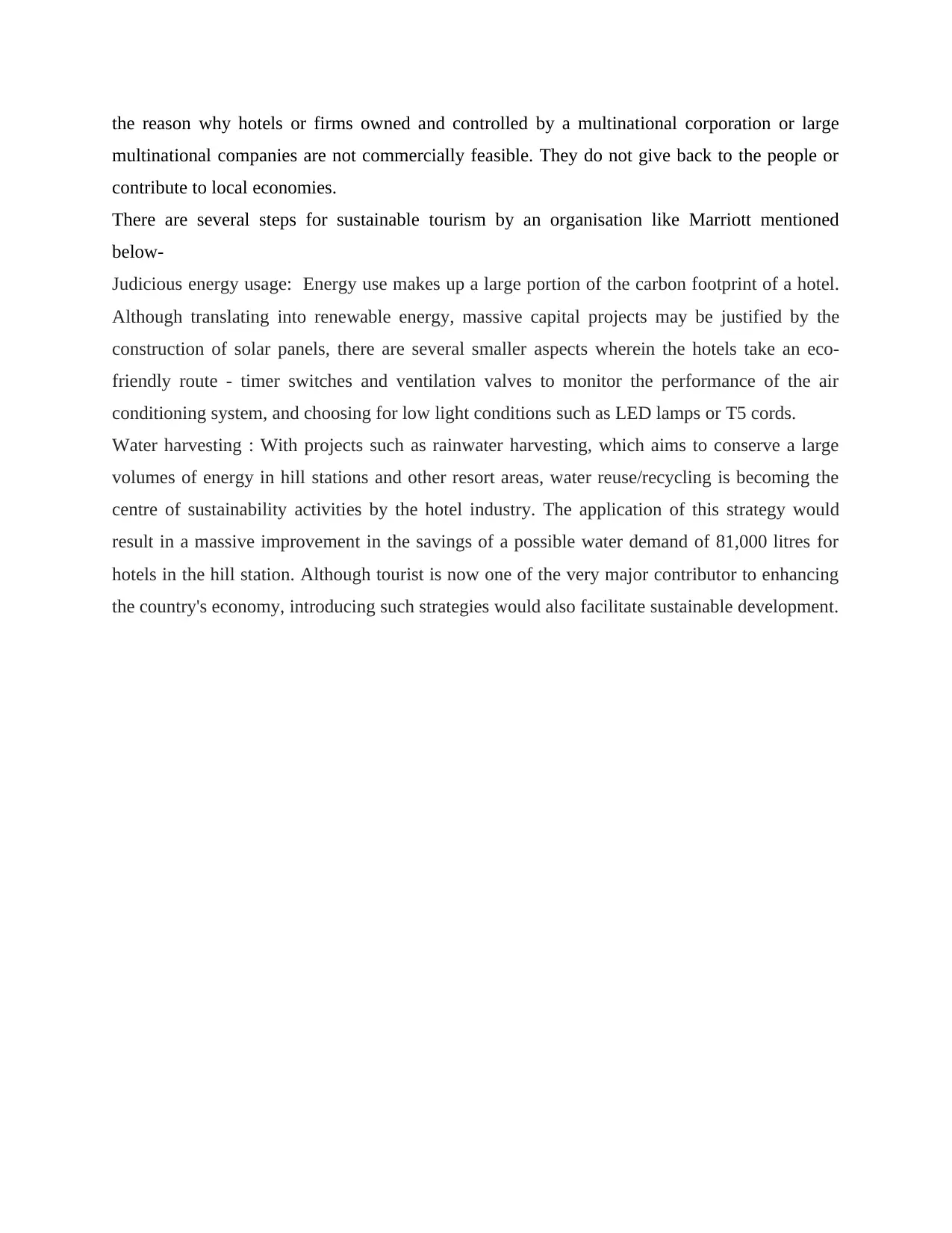
the reason why hotels or firms owned and controlled by a multinational corporation or large
multinational companies are not commercially feasible. They do not give back to the people or
contribute to local economies.
There are several steps for sustainable tourism by an organisation like Marriott mentioned
below-
Judicious energy usage: Energy use makes up a large portion of the carbon footprint of a hotel.
Although translating into renewable energy, massive capital projects may be justified by the
construction of solar panels, there are several smaller aspects wherein the hotels take an eco-
friendly route - timer switches and ventilation valves to monitor the performance of the air
conditioning system, and choosing for low light conditions such as LED lamps or T5 cords.
Water harvesting : With projects such as rainwater harvesting, which aims to conserve a large
volumes of energy in hill stations and other resort areas, water reuse/recycling is becoming the
centre of sustainability activities by the hotel industry. The application of this strategy would
result in a massive improvement in the savings of a possible water demand of 81,000 litres for
hotels in the hill station. Although tourist is now one of the very major contributor to enhancing
the country's economy, introducing such strategies would also facilitate sustainable development.
multinational companies are not commercially feasible. They do not give back to the people or
contribute to local economies.
There are several steps for sustainable tourism by an organisation like Marriott mentioned
below-
Judicious energy usage: Energy use makes up a large portion of the carbon footprint of a hotel.
Although translating into renewable energy, massive capital projects may be justified by the
construction of solar panels, there are several smaller aspects wherein the hotels take an eco-
friendly route - timer switches and ventilation valves to monitor the performance of the air
conditioning system, and choosing for low light conditions such as LED lamps or T5 cords.
Water harvesting : With projects such as rainwater harvesting, which aims to conserve a large
volumes of energy in hill stations and other resort areas, water reuse/recycling is becoming the
centre of sustainability activities by the hotel industry. The application of this strategy would
result in a massive improvement in the savings of a possible water demand of 81,000 litres for
hotels in the hill station. Although tourist is now one of the very major contributor to enhancing
the country's economy, introducing such strategies would also facilitate sustainable development.
Paraphrase This Document
Need a fresh take? Get an instant paraphrase of this document with our AI Paraphraser
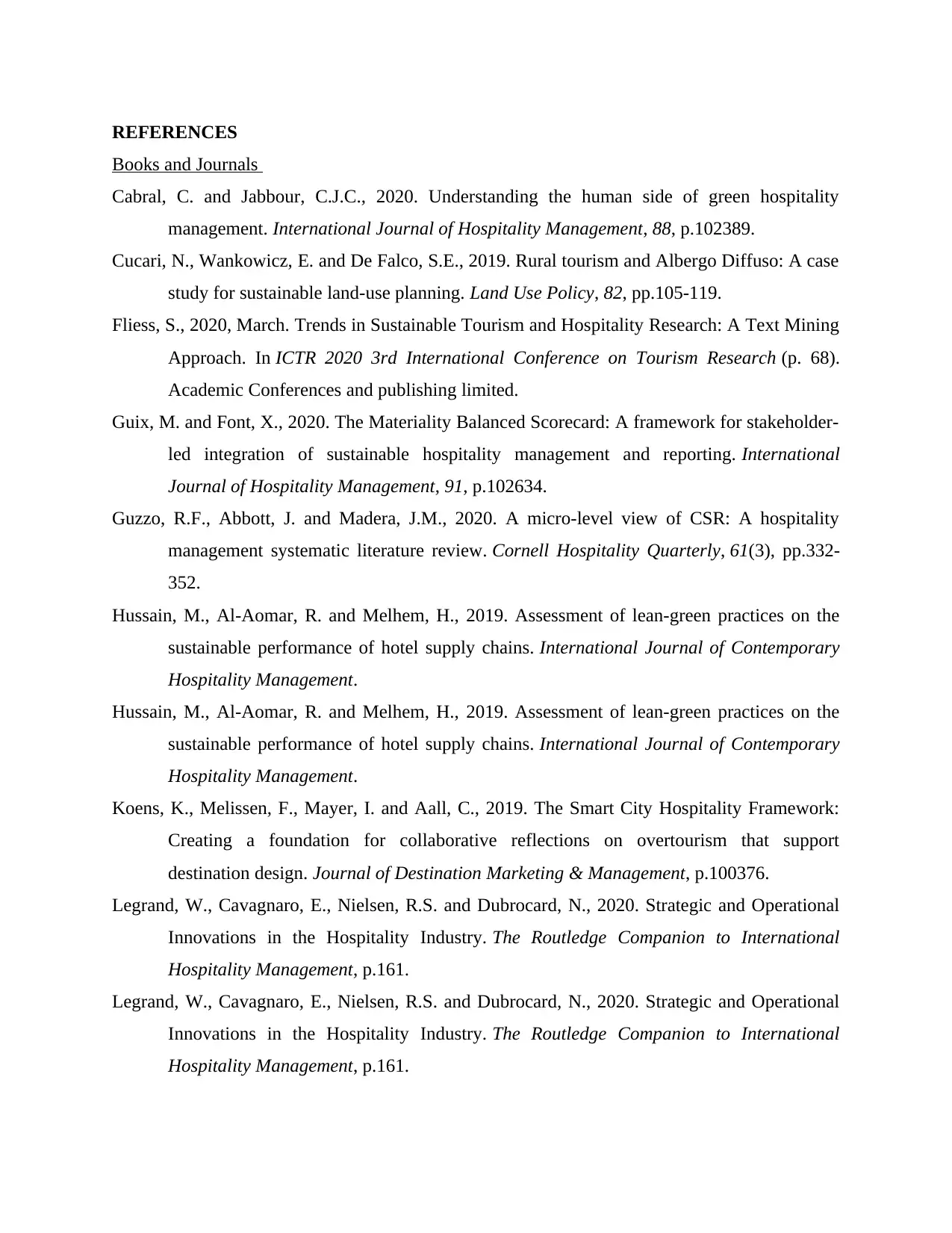
REFERENCES
Books and Journals
Cabral, C. and Jabbour, C.J.C., 2020. Understanding the human side of green hospitality
management. International Journal of Hospitality Management, 88, p.102389.
Cucari, N., Wankowicz, E. and De Falco, S.E., 2019. Rural tourism and Albergo Diffuso: A case
study for sustainable land-use planning. Land Use Policy, 82, pp.105-119.
Fliess, S., 2020, March. Trends in Sustainable Tourism and Hospitality Research: A Text Mining
Approach. In ICTR 2020 3rd International Conference on Tourism Research (p. 68).
Academic Conferences and publishing limited.
Guix, M. and Font, X., 2020. The Materiality Balanced Scorecard: A framework for stakeholder-
led integration of sustainable hospitality management and reporting. International
Journal of Hospitality Management, 91, p.102634.
Guzzo, R.F., Abbott, J. and Madera, J.M., 2020. A micro-level view of CSR: A hospitality
management systematic literature review. Cornell Hospitality Quarterly, 61(3), pp.332-
352.
Hussain, M., Al-Aomar, R. and Melhem, H., 2019. Assessment of lean-green practices on the
sustainable performance of hotel supply chains. International Journal of Contemporary
Hospitality Management.
Hussain, M., Al-Aomar, R. and Melhem, H., 2019. Assessment of lean-green practices on the
sustainable performance of hotel supply chains. International Journal of Contemporary
Hospitality Management.
Koens, K., Melissen, F., Mayer, I. and Aall, C., 2019. The Smart City Hospitality Framework:
Creating a foundation for collaborative reflections on overtourism that support
destination design. Journal of Destination Marketing & Management, p.100376.
Legrand, W., Cavagnaro, E., Nielsen, R.S. and Dubrocard, N., 2020. Strategic and Operational
Innovations in the Hospitality Industry. The Routledge Companion to International
Hospitality Management, p.161.
Legrand, W., Cavagnaro, E., Nielsen, R.S. and Dubrocard, N., 2020. Strategic and Operational
Innovations in the Hospitality Industry. The Routledge Companion to International
Hospitality Management, p.161.
Books and Journals
Cabral, C. and Jabbour, C.J.C., 2020. Understanding the human side of green hospitality
management. International Journal of Hospitality Management, 88, p.102389.
Cucari, N., Wankowicz, E. and De Falco, S.E., 2019. Rural tourism and Albergo Diffuso: A case
study for sustainable land-use planning. Land Use Policy, 82, pp.105-119.
Fliess, S., 2020, March. Trends in Sustainable Tourism and Hospitality Research: A Text Mining
Approach. In ICTR 2020 3rd International Conference on Tourism Research (p. 68).
Academic Conferences and publishing limited.
Guix, M. and Font, X., 2020. The Materiality Balanced Scorecard: A framework for stakeholder-
led integration of sustainable hospitality management and reporting. International
Journal of Hospitality Management, 91, p.102634.
Guzzo, R.F., Abbott, J. and Madera, J.M., 2020. A micro-level view of CSR: A hospitality
management systematic literature review. Cornell Hospitality Quarterly, 61(3), pp.332-
352.
Hussain, M., Al-Aomar, R. and Melhem, H., 2019. Assessment of lean-green practices on the
sustainable performance of hotel supply chains. International Journal of Contemporary
Hospitality Management.
Hussain, M., Al-Aomar, R. and Melhem, H., 2019. Assessment of lean-green practices on the
sustainable performance of hotel supply chains. International Journal of Contemporary
Hospitality Management.
Koens, K., Melissen, F., Mayer, I. and Aall, C., 2019. The Smart City Hospitality Framework:
Creating a foundation for collaborative reflections on overtourism that support
destination design. Journal of Destination Marketing & Management, p.100376.
Legrand, W., Cavagnaro, E., Nielsen, R.S. and Dubrocard, N., 2020. Strategic and Operational
Innovations in the Hospitality Industry. The Routledge Companion to International
Hospitality Management, p.161.
Legrand, W., Cavagnaro, E., Nielsen, R.S. and Dubrocard, N., 2020. Strategic and Operational
Innovations in the Hospitality Industry. The Routledge Companion to International
Hospitality Management, p.161.
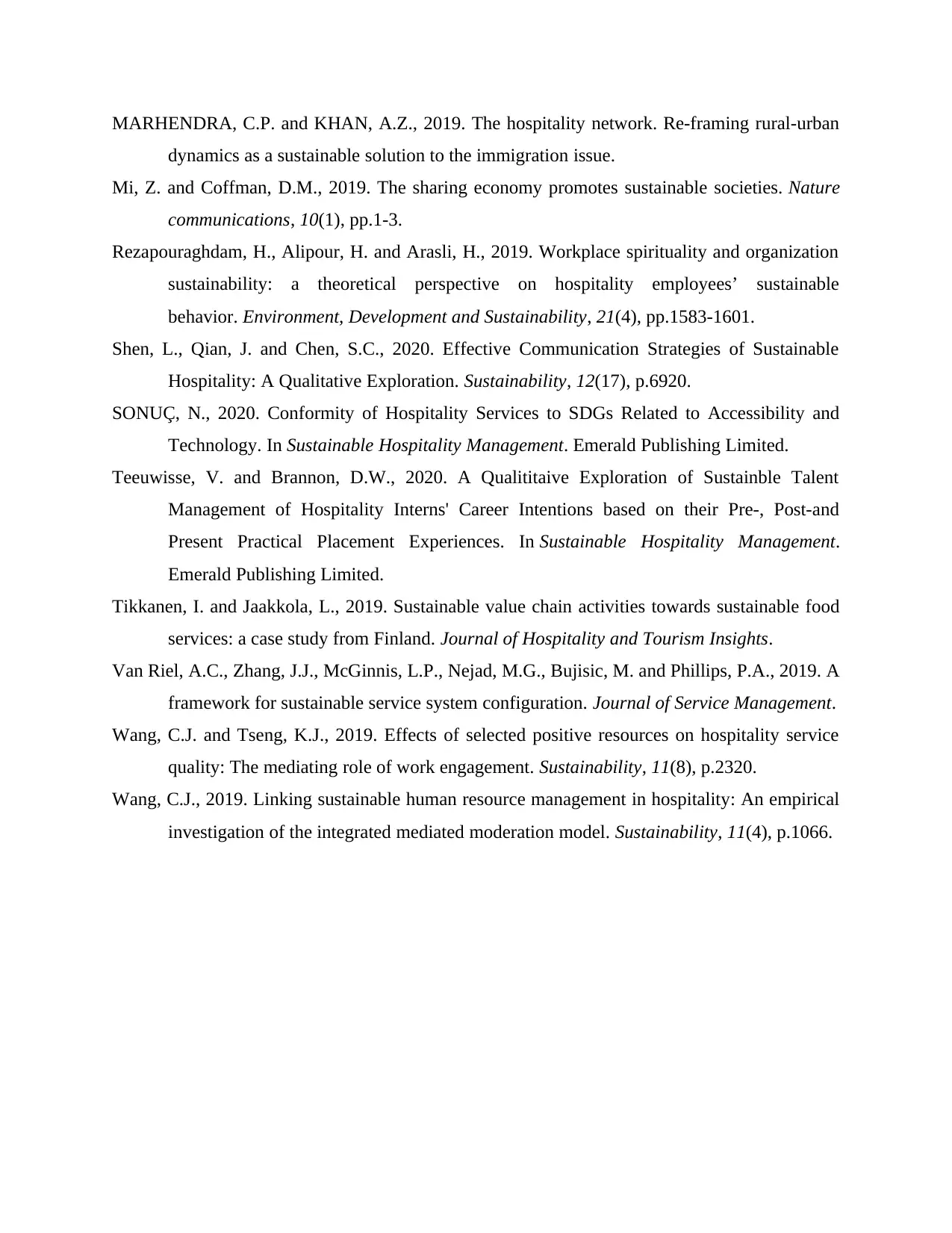
MARHENDRA, C.P. and KHAN, A.Z., 2019. The hospitality network. Re-framing rural-urban
dynamics as a sustainable solution to the immigration issue.
Mi, Z. and Coffman, D.M., 2019. The sharing economy promotes sustainable societies. Nature
communications, 10(1), pp.1-3.
Rezapouraghdam, H., Alipour, H. and Arasli, H., 2019. Workplace spirituality and organization
sustainability: a theoretical perspective on hospitality employees’ sustainable
behavior. Environment, Development and Sustainability, 21(4), pp.1583-1601.
Shen, L., Qian, J. and Chen, S.C., 2020. Effective Communication Strategies of Sustainable
Hospitality: A Qualitative Exploration. Sustainability, 12(17), p.6920.
SONUÇ, N., 2020. Conformity of Hospitality Services to SDGs Related to Accessibility and
Technology. In Sustainable Hospitality Management. Emerald Publishing Limited.
Teeuwisse, V. and Brannon, D.W., 2020. A Qualititaive Exploration of Sustainble Talent
Management of Hospitality Interns' Career Intentions based on their Pre-, Post-and
Present Practical Placement Experiences. In Sustainable Hospitality Management.
Emerald Publishing Limited.
Tikkanen, I. and Jaakkola, L., 2019. Sustainable value chain activities towards sustainable food
services: a case study from Finland. Journal of Hospitality and Tourism Insights.
Van Riel, A.C., Zhang, J.J., McGinnis, L.P., Nejad, M.G., Bujisic, M. and Phillips, P.A., 2019. A
framework for sustainable service system configuration. Journal of Service Management.
Wang, C.J. and Tseng, K.J., 2019. Effects of selected positive resources on hospitality service
quality: The mediating role of work engagement. Sustainability, 11(8), p.2320.
Wang, C.J., 2019. Linking sustainable human resource management in hospitality: An empirical
investigation of the integrated mediated moderation model. Sustainability, 11(4), p.1066.
dynamics as a sustainable solution to the immigration issue.
Mi, Z. and Coffman, D.M., 2019. The sharing economy promotes sustainable societies. Nature
communications, 10(1), pp.1-3.
Rezapouraghdam, H., Alipour, H. and Arasli, H., 2019. Workplace spirituality and organization
sustainability: a theoretical perspective on hospitality employees’ sustainable
behavior. Environment, Development and Sustainability, 21(4), pp.1583-1601.
Shen, L., Qian, J. and Chen, S.C., 2020. Effective Communication Strategies of Sustainable
Hospitality: A Qualitative Exploration. Sustainability, 12(17), p.6920.
SONUÇ, N., 2020. Conformity of Hospitality Services to SDGs Related to Accessibility and
Technology. In Sustainable Hospitality Management. Emerald Publishing Limited.
Teeuwisse, V. and Brannon, D.W., 2020. A Qualititaive Exploration of Sustainble Talent
Management of Hospitality Interns' Career Intentions based on their Pre-, Post-and
Present Practical Placement Experiences. In Sustainable Hospitality Management.
Emerald Publishing Limited.
Tikkanen, I. and Jaakkola, L., 2019. Sustainable value chain activities towards sustainable food
services: a case study from Finland. Journal of Hospitality and Tourism Insights.
Van Riel, A.C., Zhang, J.J., McGinnis, L.P., Nejad, M.G., Bujisic, M. and Phillips, P.A., 2019. A
framework for sustainable service system configuration. Journal of Service Management.
Wang, C.J. and Tseng, K.J., 2019. Effects of selected positive resources on hospitality service
quality: The mediating role of work engagement. Sustainability, 11(8), p.2320.
Wang, C.J., 2019. Linking sustainable human resource management in hospitality: An empirical
investigation of the integrated mediated moderation model. Sustainability, 11(4), p.1066.
⊘ This is a preview!⊘
Do you want full access?
Subscribe today to unlock all pages.

Trusted by 1+ million students worldwide
1 out of 9
Related Documents
Your All-in-One AI-Powered Toolkit for Academic Success.
+13062052269
info@desklib.com
Available 24*7 on WhatsApp / Email
![[object Object]](/_next/static/media/star-bottom.7253800d.svg)
Unlock your academic potential
Copyright © 2020–2026 A2Z Services. All Rights Reserved. Developed and managed by ZUCOL.




